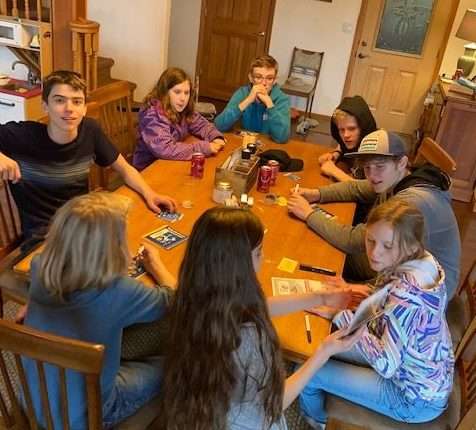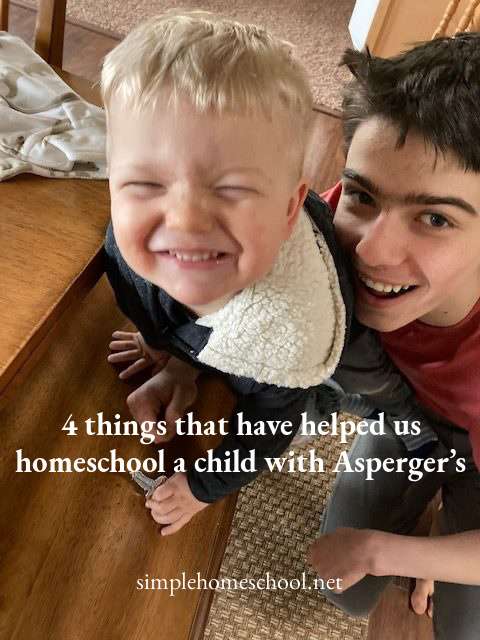4 things that have helped us homeschool a child with Asperger’s
4 things that have helped us homeschool a child with Asperger’s
~ Written by Kari Patterson of Sacred Mundane
It’s been almost six years since I last shared about our adventure with Asperger’s — so much has changed!
This December Dutch turned 14, and I marveled as I watched him joyfully interact with a great group of friends, playing games around the dining room table (see pic above). Poetically, it was at a playdate with these same kids, seven years earlier, when his struggles surfaced in such a way that we realized he had Asperger’s syndrome.
Now, as I watched him, it was hard to believe this was the same kid who seven years ago was so overwhelmed that he thrashed in my arms and cried out that he couldn’t make his brain work.
He is truly transformed in so many ways, so I’d love to share a bit of our story and four things that have helped us along the way.
4 things that have helped us homeschool a child with Asperger’s
1. Be his advocate without making excuses
No matter what quirk or diagnoses your child has, you know him best. Yes, we can learn from books, podcasts, therapists, experts. Absolutely! But at the end of the day, you know that look he gets when he’s feeling scared. You know that thing he does with his hands when he’s trying to calm himself down. You know why he carries that certain item everywhere he goes. You know how that seemingly innocent situation causes him to panic, or shut down, or act out.
I remember a Sunday School situation where after church I found Dutch huddled in the corner, red-faced, angry and sobbing, crying, “They’re mocking me! They’re mocking me!”
He said he never wanted to come to church again. I knew the teacher and the children and couldn’t imagine them mocking him, so I tried to learn more about the situation.

I learned that he had not wanted to play a certain game they were playing (common), and so they’d sung a song about him (at him) to get him to play. It was meant to be humorous, but children with Asperger’s have a hard time picking up on sarcasm, or understanding well-intended joking. In his little brain his teacher and the entire classroom were singing in unison to make fun of him. Of course that was not the intent, but knowing how Dutch’s brain works helped me to enter into the situation and be his advocate. No one else knows our children like we do, so no one is better able to advocate for them.
That said, I have tried to never use Asperger’s as an excuse for misbehavior. When Dutch was eight he was very disrespectful and disobedient and I found myself making excuses for him. I met with a mature mom and educator and asked for her advice. She was kind, but firm, as she said,
“The standard is the same, you will just have to work harder to reach it. He will still need to be obedient and respectful. You can be empathetic but you cannot allow Asperger’s to be an excuse for poor behavior.”
2. Celebrate his “trait” and give him examples to follow
When Dutch was seven we sat him down and explained what we’d discovered. We told him about a special “trait” (we didn’t call it a syndrome or disorder) he had, called Asperger’s, that many great people in history probably had (though it wasn’t named yet). We talked about Einstein, Benjamin Franklin, Mozart, even Bill Gates.
We explained that because he had this trait some things were going to be much easier for him, and some things were going to be much harder.
I told him some of the ways that his brain was special and strong, and some of the ways that he might struggle. Then we affirmed that we were committed to helping him, loving him, teaching him, training him, doing whatever was needed to help him succeed as a boy with Asperger’s.
Then we never mentioned it again.

Of course we read, we learned, we prayed, but we just wanted him to be a uniquely gifted kid without worrying about labels.
As he grew, we also tried to give him examples of godly, well-adjusted people with Asperger’s. Several years ago my husband Jeff began listening to Brant Hansen (who has Asperger’s) with Dutch. Dutch LOVED him. So we bought him Brant’s books. Blessed Are the Misfits was profoundly impacting and helped Dutch understand himself in the context of church and even his relationship with God.
Interestingly, this year of restrictions (due to COVID) has actually been a blessing in disguise for Dutch as we adopted a House Church model. He gets less overwhelmed (no crowds, no loud amplification) and the format lends itself to frank, deep discussion with people he knows (his fav) rather than surface-level small talk (he loathes).
3. Let him lead when it comes to learning about himself
One day this year I was standing in the kitchen, and Dutch was hunched over his computer, intent on something, for quite awhile. Occasionally, he would ask me questions about himself: “Do you think I get easily overwhelmed in crowds?” Or, “Do you think it’s hard for me to pick up on sarcasm?” I answered his questions, and after awhile he finished his task and announced with a huge smile,
“Guess what? I think I have Asperger’s!”
I laughed to myself because of course we had told him he had Asperger’s 7 years ago, but apparently he didn’t remember that! This was hilarious to me!
We had not mentioned it all these years, but just from him following, listening to, and reading material by Brant Hansen, he was able to identify many of the same qualities in himself. I loved that he took it upon himself to take a diagnostic quiz, and that he saw the results as such a positive thing, because it made him that much more similar to his hero Brant.
I think we can all identify with this. Most of us enjoy taking personality tests or learning more about our uniqueness, when we initiate the interest. But most of us don’t like being labeled or diagnosed by others. Seems reasonable that kids are the same.
4. Choose stresses carefully
We didn’t want to coddle Dutch and make the world revolve around him, since that isn’t how real life works. I had even read once that since a church setting can be particularly stressful for children with Asperger’s that parents shouldn’t make these children attend church. I respectfully disagree.
However, I learned the hard way we needed to choose his stresses carefully. That is, making him do baseball practice, a baseball game, piano lessons, a playdate, a trip to Costco AND church all in one week was a disaster.
For us, church is a non-negotiable and so are close friendships, so the answer was to ditch baseball and piano (which he disliked anyway). Admittedly, a part of me felt like a failure that my child wasn’t doing any extra-curriculars, but removing those two things brought him back into balance.
Life has stress. That’s inevitable. All of us introverts know that there are situations that are stressful but still worth doing. So we try to choose those stresses carefully.
Now, at 14, Dutch is an absolute delight to our family. He patiently counsels his sister when she’s anxious. He helps her with math. He plays with and babysits his toddler brother for hours. When our baby was born this fall Dutch would hold him for hours and soothe him when he was fussy. He constantly helps me around the house, he carries in the groceries, he’s like having another full-grown man around the house! I just never dreamed that the struggling little boy thrashing in my arms would become a confident, capable young man. We still have a lot of room for growth, but I thank God for all He has done so far.
So, if you ever want to talk more about homeschooling a child with Asperger’s, please reach out! I’m certainly no expert, but I can empathize. I’ve cried more over this kid than the others combined!
Are you also walking this same journey – to homeschool a child with Asperger’s? What has helped you along the way? What has been most challenging? Let’s encourage each other!
What’s Your Homeschool Mom Personality? Take Jamie’s quiz now and receive a free personality report to help you organize your homeschool based on what your personality type needs most!



Thank you for your uplifting insightful post!
Thank you for the encouragement!
Thank you for this. I have 2 in homeschool with autism and to hear encouragement and tips from other moms of special needs kids is much needed.
Oh thank you, Maggie! I’d love to hear what has been helpful for you too.
Whether Aspergers or any other special trait these are great things to keep in mind. Thanks for putting it down “on paper.”
Thanks for sharing! I needed was what I needed today and everyday.
Thanks, Mandi!
Thank you so much for writing this! This is encouraging to me. My oldest is almost 12 and has aspergers. Do you think the Brant Hansen book would be appropriate for him? Thanks!
Thank you! Very encouraging to me!!!!!
Oh good! Thanks, Jen!
Hi Kari, I was very interested to read about your approach to homeschooling Dutch. I have been homeschooling my grandson Shaun for going on 3 years. He turned 14 last Dec so is the same age as Dutch. Shaun lives in Samoa with us his grandparents while his parents and siblings live in NZ. We have always travelled back and forth from Samoa to NZ, but covid has had us stuck in Samoa for now. His Dad, my son and his Mum have totally entrusted Shaun to me. He went to mainstream school, but he was not getting anywhere so I offered to homeschool him. I have the same love for learning as you have and have instilled that in Shaun. He loves to learn and is doing so more successfully now he is homeschooled.
He is mildly autistic, but I do not dwell on that as I do hate labelling of any kind. I told Shaun he is a smart boy with some issues. He reacts emotionally to situations, but I am teaching him to recognise he is being too emotional and over reacting sometimes and has to calm down and think instead. He is doing this more often. No child that can understand what they are doing should be allowed to misbehave. He is taught to respect others and to have good values. He is an intelligent and deep thinker, very precise and detail orientated. Frankly, it is no guarantee that all children that attend mainstream schools will easily interact and socialise with others. Far from it. A lot has to do with the child’s personality to start with. Shaun is more outgoing than his brother Marcus who is very shy. Shaun will readily go purchase an item if you ask him, but Marcus has to be persuaded. Shaun will struggle with small talk, but can carry on a full conversation about a topic he likes or knows about. In fact I have to stop him talking at such times. He does take things literally and not detect sarcasm. He will play a joke on me, but still has to learn to take one. People who talk to him have always said he is a smart boy, a good well mannered boy. Of course if he feels stressed about something then the emotions and lack of confidence can kick in. However, as he grows up he is better handling situations. I go by my instincts and knowledge of him. I am not only educating him, but molding him into the young man he will be. I am his grandmother not mother so it is not my duty to do this, but rather I see it as a loving journey together where we are both learning, having beautiful conversations, building great trust and a strong bond between us. He is still close to his very loving parents and siblings. David and Soa have 3 other kids doing well in mainstream school so I offered to take Shaun under my wing. I excelled in school going through to University to get my degree. However, I personally feel they unnecessarily try to cram too much into the young ones’ minds and should concentrate a bit more on preparing them for the world outside school. I am more in sync with how they teach in Finland. Why other schools in other countries don’t follow suit is baffling.
Shaun struggled with writing, spelling, writing his thoughts down in his own words. He is improving alot just this year. I have him research online a topic like whales which he loves, draw it first as he loves art then write about it in his own words. I don’t dwell on mistakes in spelling and grammar at this stage. Does Dutch have such issues?
Elaine
Thank you so much for sharing this, Elaine. Wow, what a journey you are on. I’m so grateful Shaun has you for a grandmother! Yes, Dutch definitely struggles with writing and spelling. He REALLY struggled with spelling when he was young, he’s actually pretty much at grade-level now. The biggest challenge for him is definitely hand-writing … it’s terrible. It’s common for fine-motor skills to be tricky for kids with Asperger’s. I’m grateful that most things are done on the computer nowadays!
I’m very curious about the Asperger’s diagnosis. I thought that was phased out some time ago in favor of ASD. I have a son a lot like yours, and his diagnosis is ASD. It’s quite the road, and ABA therapy had been invaluable!!
Hi Anne, I guess what I’ve understood is that Asperger’s is a form of high-functioning Autism. I don’t know a lot about the specifics of diagnoses because we opted against getting a formal diagnosis because at 7-years-old we thought the process would have been too stressful for him. I’d love to hear more about ABA therapy–how has that been helpful for your son? Thanks, Anne!
We had to have a formal diagnosis in order to qualify for ABA services. I think a family could pay cash for services without a diagnosis, but the cost would be in the tens-to-hundreds of thousands of dollars. My boy is high-functioning, too. He qualifies for 10 hours of services each week, and during that time we have 1-2 therapists in our home working with him, working with me, working with each other. We take a lot of data about his behaviors, and then we work together to help him fade out negative behaviors and fade in positive ones. My boy has needed meds for anxiety, aggression, and ADHD as well, but those just give his brain the space it needs to use the skills he’s learned in therapy. We have successfully helped him stop using aggression as his main means of coping, and that’s all I cared about at first, so I thought we were ready to end services. However, now that we’re healing from the trauma of the past, we’re seeing that ABA can help him with social skills, understanding body language and verbal nuance, perseveration, scheduling rigidity, and a host of other “small skills” that will improve his quality of life. I hope that helps!
I was so encouraged by the “4 things” shared in this blog.
Thank you for opening your heart to share your experiences with other.
God bless you!
This was such a lovely story and one I can empathize with wholeheartedly! My eldest was diagnosed on the Autism Spectrum. He is high functioning and verbal and would fall in the Asperger’s realm. I can say that ABA has been a Godsend and a challenge all wrapped in a box that is meant to support the individual child.
ABA stands for Applied Behavior Analysis and the book ‘Positive Parenting for Autism’ by Victoria Boone is an amazing start and helps parents better understand the process and move it into the home!
Another great book that helps break down the processes and date that is used in ABA is ‘ABA Visualized’. It is really thorough and breaks the information into information that is easier to understand and incorporate into the day.
I want to thank you Kari! I love how you told your son about Asperger’s and how there have been important people in history that have been on the Autism Spectrum <3 When I talked to my children about my eldest, I explained that all our brains are different and it's how God created us. We all have our own strengths and improvements, and that's how we are supposed to be. Since my children love Albert Einstein and he was thought to be on the Spectrum, I use him as an example all the time! It's nice to hear that it went very similarly in your home too <3
Thank you again for this beautiful article 🙂 I look forward to reading other articles and your family's journey with homeschool and all the similarities and differences with our day to day 🙂 🙂 🙂
I’m 28 & have just recently learned that I have Aspergers. It has explained so much & has kind of given me a new lease on life. All of the things I felt so self-conscious about & all of the things that made me feel like I was failing as an “average” person, they can all be attributed to asperger’s. So the fact that I am a nurse, a Mother, a loving wife & the few close relationships I have are all blessings. I wish people knew more about people like me – that people with Asperger’s are really just normal people with a different perspective. We are highly sensitive, which can be STRENGTHS. I need to get on with it & make my videos about my experience with aspergers. Thanks for posting this. It will be very helpful for my family to see it simply explained.
Thanks for sharing about your homeschooling journey. I mean this in the gentlest way possible – Asperger’s hasn’t been a diagnosis since 2014 and the term has a lot of unsavory connections. Functioning labels are also widely reviled in the adult autistic community, as is ABA therapy. Your son would likely just be described as “autistic” or “autistic with low support needs,” if that was relevant. There is a lot to learn about the neurodiversity movement, but it’s so worth if if you have a differently wired person in your life! Neuroclastic has some good articles and resources to check out. https://neuroclastic.com/autism/what-is-autism/
Hi Kari,
My name is Angee and I am homeschooling our 12 yr old 6th grader son. We have homeschooled since kindergarten so this is not anything new BUT when he was younger it was easier to make it fun and keep him interested. We have always belonged to a Co-Op which we loved for elementary age but leading into middle school the work load in our Co-Op was going to be too much to handle. So we decided to pull him out and try it at home that way I could scale his work and link things together that he was interested or fixated on. Well Math is one of its own. I had hired a friend that homeschools her children as well to teach him math 2 days a week. There were so many times that he did the wrong problems, didn’t do the work or at this point he did a 5 day packet for her and handed it in and he completly bomed it. He was so mad when I confronted him about it and just had a total meltdown!!! He says it too much and too hard! And I can not tell with him in. math if he just does’nt want to do it or if he really has an issue with it. So he redid the work and it was submitted. However I will not be asking her to teach him again bc I feel like he was a little to disrespectful to her and her him. So basically I feel like I am at my whitts end of trying to help my child succeed. We have talked about private school or public school and he wants nothing to do with either one and I can honestly say the schools in our area would just crush any kind of confidence he has and emotions. I am trying so hard I relentlessly research and try to find help but its either not out there or the programs that they offer for ASD kids online is like 500.00 a month. Please any advice or guidance would be greatly appreciated bc i am loosing it over here and I don’t want to fail my child.
Thank You
Angee